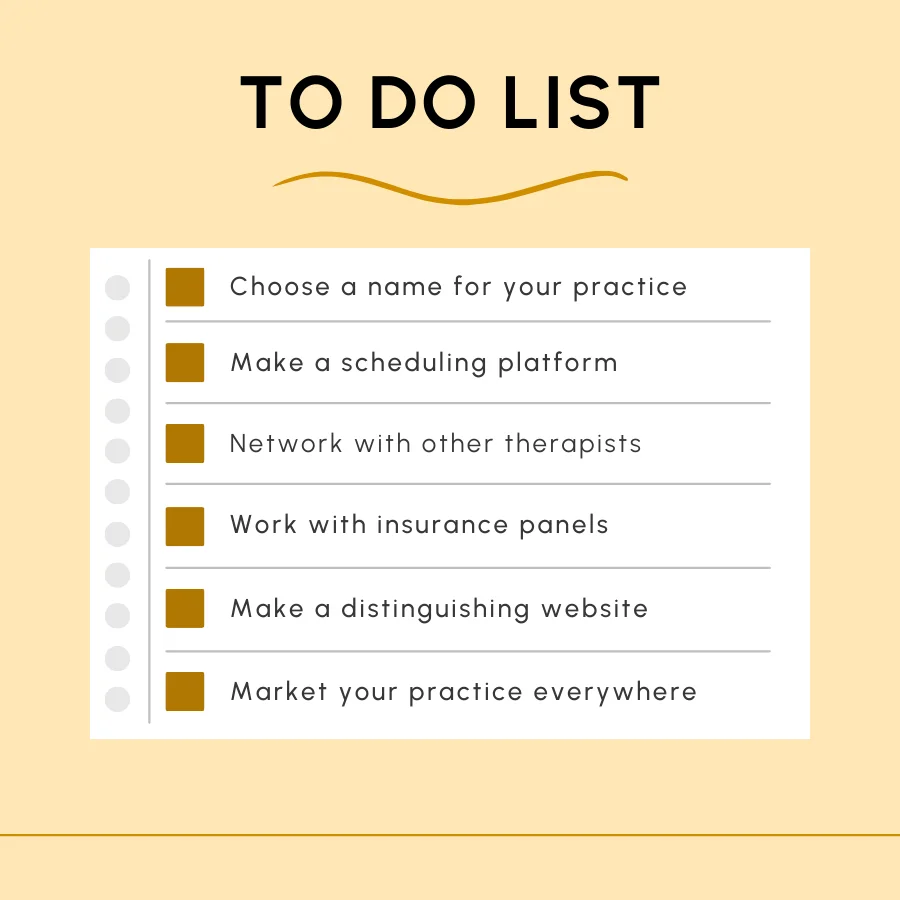Starting a private practice can be an exciting and rewarding career move for many healthcare professionals. Whether you are a therapist, doctor, or counselor, launching your own practice allows you to have more control over your work and client base. However, it can also be a challenging process. From obtaining the necessary licenses and insurance to finding the right location and marketing your services, there are many important steps to consider. In this article, we will explain how to start a private practice as a beginner.
Why Start a Private Practice?
Starting a private practice in the healthcare field can be hard at first, but it is also incredibly rewarding. For many healthcare professionals, the idea of running their practice is an appealing one, as it allows them to have more control over their work, patients, and financial success.
One of the main reasons to start a private practice is the autonomy it provides. Healthcare professionals can set their own hours, choose their own patients, and create their own treatment plans.

This freedom can lead to a more personalized and flexible approach to patient care, as well as a greater sense of professional satisfaction. Additionally, there are many benefits to starting a private practice. With the ability to set their own prices and billing structures, healthcare professionals have the potential to earn more than they would in a traditional employment setting.
However, there are more reasons to start a private practice, which are:
- Freedom to choose the procedures: Being your own boss helps you completely avoid following the book, and use your own practices on helping patients.
- Higher learning potential: Managing a business helps many practitioners to understand more about management, marketing, finance handling, and much more.
- Better patient relationships: Running your own private practice grants you the ability to choose how patients are handled, and treat them more properly.
- Choosing the angle of the business: While most clinics have a professional and non-family-oriented relationship, you as a business owner can create your own standards.
How to Start a Private Practice
Define Your Niche
When starting a private practice, it’s crucial to define your niche to set yourself apart in a competitive market. Defining your niche means identifying a specific area of expertise that you will focus on in your practice. This could be a specialty such as marriage counseling, addiction therapy, or trauma treatment. In other cases, it could be a specific population such as children, adolescents, or LGBTQ+ individuals.
By honing in on a niche, you can differentiate yourself from other therapists and attract clients who are seeking specialized services. To define your niche, it’s important to reflect on your interests, skills, and experiences, as well as to conduct market research to determine the needs and demands.

Once you have defined your niche, you can tailor your marketing efforts, develop specialized expertise, and build a reputation in your chosen area of focus. Remember that changing the niche may be complicated, and result in entirely re-branding your business.
Before you can truly appreciate the progress your therapy practice is making online, you need to understand where you started. Setting baselines involves capturing data from the onset of your online initiatives. This might include the initial number of website visitors, the engagement rate on your first few social media posts, or the ranking of your website on search engines at the beginning.
Having a clear baseline gives you a point of comparison as you implement various online strategies. It allows you to track improvement over time in a structured way. For example, if your baseline data shows an average of 50 website visits per week and after implementing SEO strategies you notice an increase to 150 visits, you can clearly see the impact of your efforts.
Name Your Therapy Practice
When starting a private therapy practice, one of the first steps is to choose a proper brand name. Choosing a name is an important decision, as it will be the identity of your business and should reflect the values and services you provide. When naming your therapy practice, it’s important to consider how it will resonate with potential clients.
You may consider using your own name in the practice name to establish a personal connection with clients. Perhaps, you may want a name that reflects the type of therapy you offer, such as “Mindful Counseling” or “Empower Therapy”. It’s also important to ensure that the name you choose is not already in use by another therapy practice in your area to avoid confusion and potential legal issues.
An ideal name for a private practice should:
- Contain the brand name, followed by the service (e.g. counseling).
- Be no more than 10 characters, which will help people remember it.
- Not contain numbers, as it doesn’t look professional.
- Not contain hyphens, as it often raises questions.
Once you have chosen a name, it’s a good idea to check if the domain for your practice name is available for a website, as having a strong online presence is crucial in today’s digital age.
Develop a Business Plan
Before starting your private therapy practice, it is important to develop a solid business plan to set the foundation for your success. The first step in this process is to name your therapy practice.
Once you have a name, you can start outlining your business plan. This plan should include a detailed overview of your practice, including the services you offer, your target market, and your target audience.

It should also include a financial plan that outlines your budget, projected expenses, and expected revenue. It is important to consider factors such as rent for office space, insurance, marketing costs, and necessary equipment or supplies.
Additionally, you should outline your marketing strategy, detailing how you plan to attract clients to your practice. This may include utilizing social media, networking with other healthcare professionals, or advertising in local publications. You can also outsource therapist marketing agencies, who can take the heavy lifting of digital marketing, but you will need to set business goals beforehand.
Finally, your business plan should consider the legal and ethical aspects of running a therapy practice, such as obtaining necessary licenses and insurance. Developing a comprehensive business plan will help you set clear goals and strategies for your private therapy practice, and will provide a roadmap for success.
Prepare a Budget
When starting a private therapy practice, it is crucially important to prepare a budget. The first thing to consider is how much money you have available to invest in the practice, and for how long.
This includes the cost of:
- Renting office space: If you will be meeting in person, and not offering online therapy alone.
- Hiring staff: That will take care of the marketing, or hiring a business advisor to help manage your newly started business.
- Purchasing equipment and software: To help with insurance billing, and manage your workflow efficiently.
It’s important to be realistic about your financial situation and understand the initial costs of running a private practice. Once you’ve established a budget for the start-up costs, it’s essential to create a financial plan for the ongoing expenses of running your practice.
This should include the costs of rent, utilities, insurance, marketing, and any additional expenses that may arise. Creating a budget will not only help you manage your finances, but it will also give you a clear understanding of the financial health of your practice. By carefully preparing a budget, you can set yourself up for success and ensure the long-term viability of your private therapy practice.
Decide between private pay or insurance
It is a key decision to make whether to operate on a private pay or insurance-based model. Private pay means that clients will pay for your services out of pocket, without involving insurance companies. This gives you more control over your fees and the services offered, as well as faster payment turnaround.
However, it may limit access to some clients who rely on insurance coverage to pay for therapy. On the other hand, accepting insurance can broaden your potential client base, as it allows clients to use their insurance to cover the cost of therapy. This can make therapy more affordable and accessible to a wider range of people.

However, working with insurance companies also means dealing with their regulations, paperwork, and potentially lower reimbursement rates. It may also require you to have a diagnosis for each client, which can impact privacy.
Some therapists may choose to offer a combination of both payment options, to cater to a more diverse clientele. It’s important to carefully weigh the pros and cons of each approach and consider how it aligns with your overall vision.
Find a Therapy Office Space
One of the key steps in starting a private therapy practice is finding an office space where you can meet with your clients. The benefits of having a designated therapy office space are numerous, including providing a comfortable and professional environment for your clients, ensuring privacy, and having a dedicated space to focus solely on your practice.
When considering where to set up your therapy office, you will need to decide whether to pay for your own office space or opt for a co-working space. Having your own office space gives you the freedom to customize the environment to your liking and create a space that reflects your brand and personality.
However, it also comes with the responsibility of managing all aspects of the space, from rent and utilities to office supplies and maintenance. On the other hand, co-working spaces offer a more affordable option but lack privacy and personalization.
Ultimately, the decision between paying for your own office space or using a co-working space will depend on your budget, needs, and preferences as a therapist. Regardless of the route you choose, your office should be close to your target audience, and inside the areas where your services are provided.
In the dynamic world of therapy practices, social media has become a cornerstone for building and maintaining client relationships. Through social media analytics, therapy practices can gain a clear perspective on their online impact, facilitating a deeper understanding of their audience’s needs and preferences.
Develop Client Onboarding and Care Processes
Starting a private practice comes with the challenge of developing effective client onboarding and care processes. It is essential to have a well-defined system in place for bringing new clients on board and providing them with exceptional care. The process should begin with a smooth and professional intake process, where clients feel welcomed and valued from the very start.
This can include having a dedicated intake coordinator or utilizing technology to streamline the process. Once clients have been onboarded, it is important to have a clear and thorough assessment process to understand their needs and develop a personalized care plan. It can include comprehensive evaluations, thorough medical history reviews, and collaborative goal-setting with the client.
Additionally, establishing clear communication channels and expectations from the beginning can help ensure that clients feel supported and informed throughout their journey with your practice.
It is also crucial to have efficient and reliable systems in place for scheduling appointments, managing client records, and coordinating care with other healthcare providers if necessary.
Developing a client care process can also involve implementing effective follow-up procedures to monitor progress and address any concerns that may arise. By dedicating time and effort to developing a comprehensive client onboarding and care process, healthcare providers can create an exceptional experience for their clients and set the stage for long-term success in their private practice.
Market Your Practice
One of the key steps in an everlasting business is to market your practice effectively. This involves creating a strong brand presence, building a professional website, and utilizing popular digital marketing strategies. One valuable approach to successfully getting noticed is to choose a therapy-oriented digital marketing agency.
These agencies specialize in understanding the unique needs and challenges of mental health professionals and can help you create a tailored marketing strategy. They can assist with creating a professional website, developing a strong social media presence, and using search engine optimization to increase your online visibility.
A proper agency can help you create compelling content such as blog posts, videos, or podcasts that showcase your expertise and attract potential clients. By working with a therapy-oriented digital marketing agency, you can focus on providing quality care to your clients while leaving the marketing aspect in capable hands.
Furthermore, networking with other professionals in the field, joining professional organizations, and speaking at community events are also effective ways of marketing your practice. These activities can help you establish credibility and build trust within the community. It is important to remember that marketing your practice is an ongoing process and requires dedication and consistency.
Challenges of Running a Practice
Running a private practice comes with its own set of unique challenges. From managing staff and dealing with administrative tasks to navigating the ever-changing landscape of regulations and technology, and much more. Private practice owners are faced with a multitude of obstacles that require careful navigation and strategic planning.
Managing Operations
One of the main challenges of running a practice is managing the day-to-day operations. This includes overseeing staff, ensuring quality patient care, and dealing with administrative tasks that can often be overwhelming. From scheduling appointments and managing billing to keeping up with inventory and supplies, there is no shortage of responsibilities that fall on the shoulders of practice owners.
Dealing with Regulations
Another major challenge is staying abreast of regulations and technological advancements. In the healthcare industry, for example, practices must comply with ever-changing regulations, such as billing and electronic health records. Similarly, private practices must stay abreast of changes in laws and regulations that may impact their clients. In addition, technology is constantly evolving, and practice owners must stay informed about new tools and systems that can improve efficiency and patient/client care.
Financial management
Financial management is also a significant challenge for practice owners. They must navigate complex billing systems, negotiate contracts with insurance companies, and manage cash flow. Practice owners must also oversee the financial stability and growth of their businesses, including budgeting for expenses and determining pricing for services. They must also keep up with regulatory changes and compliance requirements, which can add additional complexity to their financial management responsibilities.
In addition to these challenges, practice owners also need to consider investment opportunities and long-term financial planning to ensure the success and sustainability of their practices. This includes making decisions about when to expand, hire additional staff, or invest in new technology or equipment.
Overall, financial management is a critical aspect of running a successful healthcare practice. It requires careful attention to detail, good decision-making skills, and the ability to adapt to changing market conditions. Seeking support from financial advisors or consultants can be beneficial for practice owners looking to improve their financial management practices and ensure the long-term success of their businesses.
Remember, the journey to digital excellence is ongoing, filled with opportunities to learn, adapt, and grow. For any further insights or assistance in steering your practice’s online journey, feel free to reach out to us on our contact page. Here’s to your continued success and growth!

